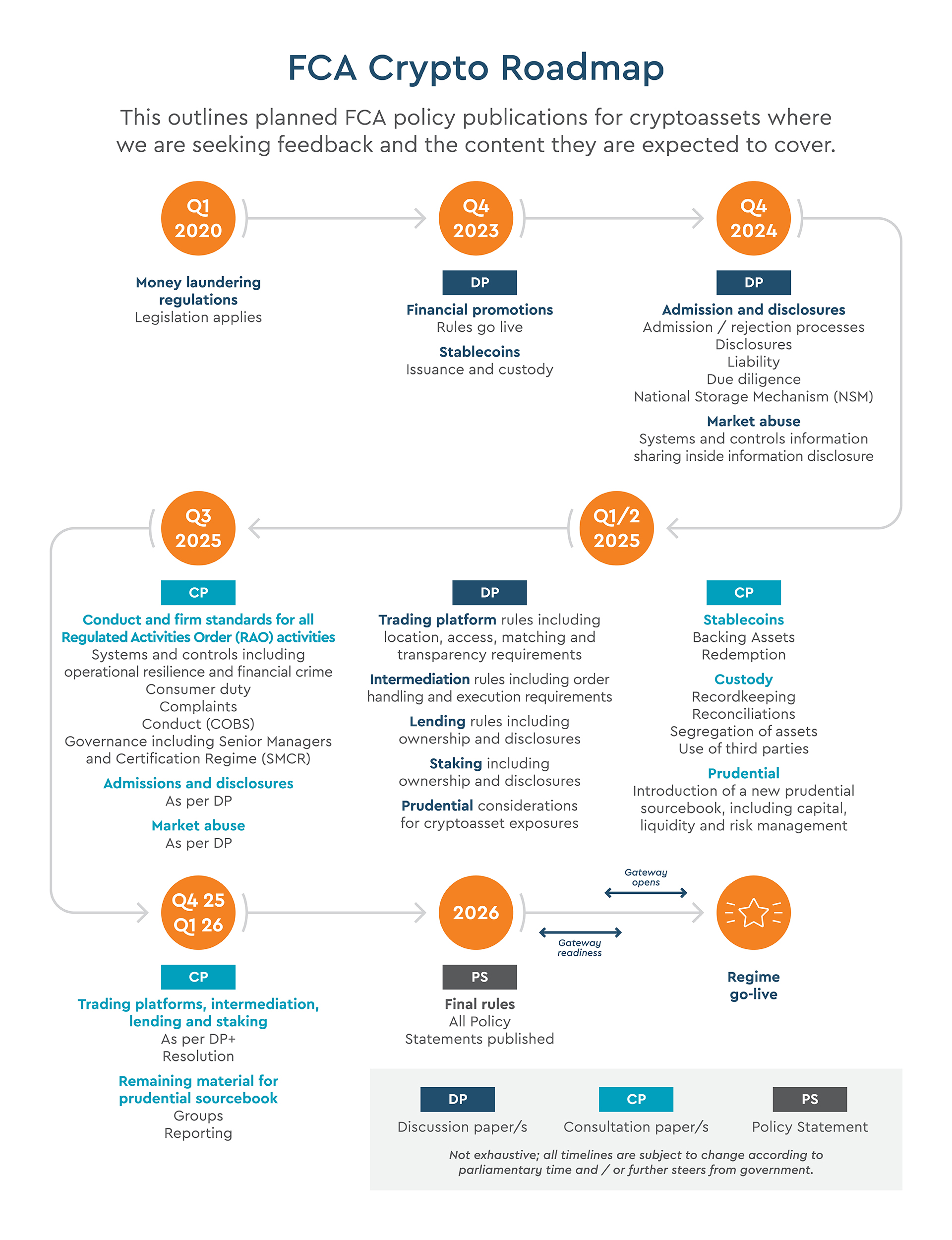
Around 12% of UK adults own or have previously owned crypto. With the phenomenon becoming more mainstream, both the FCA and UK government have been considering how cryptoassets will be regulated.
The recent discussion paper (DP25/1) and HM Treasury (HMT) Policy Notice demonstrate this continued focus on cryptoassets. With cryptoassets set to be brought more fully into the regulatory perimeter by 2026 and a clear roadmap shared by the FCA, firms can now start considering their implementation plans.

What regulations are currently in scope for cryptoassets?
Certain instruments are already within the perimeter of core investment regulations e.g., crypto tokens that are considered securities. And for a wider array of crypto instruments, there are elements of a broader framework in place with Financial Crime provision through application of the Money Laundering, Terrorist Financing and Transfer of Funds Regulations 2017 and a comprehensive financial promotions regime.
Recent publications around cryptoassets – what is the direction of travel?
FCA Discussion paper 25/1
On 2 May 2025, the FCA issued a discussion paper on regulating crypto activity, dealing with their aim of more fully regulating:
- Cryptoasset trading platforms
- Intermediaries
- Lending and borrowing of cryptoassets
- Restructuring the use of credit
- Staking
- Decentralised finance (DeFi)
This insight into what will be regulated under the future state enables firms outside the perimeter to determine whether this status will likely change. It also gives firms an insight into the new requirements to which they will be subject.
At this point, firms should be:
- considering whether authorisation will need to be sought under the new regime
- performing a gap analysis around their current processes to identify where change will be most needed in order to comply.
HMT Draft Policy Note
In April 2025, the FCA issued a draft policy note to amend the Regulatory Activities Order (RAO) to bring cryptoassets into the regulatory perimeter for financial services. These were the key messages included:
- New definitions (“qualifying cryptoassets” and a sub-set of “qualifying stablecoins”) along with the following associated activities: Stablecoin issuance, safeguarding, operating a qualifying cryptoasset trading platform, dealing in qualifying cryptoassets as principal or as agent, arranging deals in cryptoassets, and staking.
- For firms performing any of the activities in scope of the future RAO, they will need to obtain full authorisation with the FCA for part 4a permission under FSMA.
This policy note serves to highlight the fact that firms should be considering now whether an authorisation application to the FCA will soon be necessary. With material costs incurred during this process, directly through the cost of preparing the application, and indirectly through the cost of adapting to a greater regulatory burden, firms should plan now to have the financial resources available.
Stablecoin issuance and Cryptoasset custody Consultation Paper
In May 2025, the FCA issued a consultation paper (CP25/14) on the matter of how cryptoassets should be safeguarded to protect consumers in the event of insolvency.
Firms can respond to the consultation paper up until 31 July 2025. The FCA is requesting responses from firms in relation to the following:
- Whether Consumer Duty is sufficient for the purpose of regulating cryptoasset custodians.
- Whether the proposed approach on segregation, record keeping and reconciliation of cryptoassets is appropriate.
Within the consultation paper, the FCA has outlined draft CASS handbook text capturing CASS 16 and CASS 17, which focus on safeguarding stablecoin-backed assets (CASS 16) and qualifying cryptoassets (CASS 17) respectively. These chapters cover a broad range of requirements, including record keeping, reconciliations, use of third parties, organisational arrangements, regulatory reporting, and client statements.
The introduction of these additional CASS chapters would require firms to reconsider their operational processes, team structures and resource capacity before implementing the change necessary to remaining compliant with the FCA’s proposed approach.
With CASS a major driver of compliance costs and complexity in the investments sphere, this FCA consultation cannot be ignored by firms providing custody in the crypto space. Surviving and thriving as these regulations come into force will require a material spend on systems and personnel. Just as with planning for a future authorisation, custodians should be considering now how they are going to fund their CASS operation in this new world.
A prudential regime for cryptoasset firms
In May 2025, the FCA issued the consultation paper (CP25/15), consulting on the proposed prudential regime for the crypto sphere.
The main areas of focus included the following:
- The definition and composition of capital for own funds purposes – including the definition and ‘tiers’ of capital that are eligible as regulatory capital.
- Own funds requirements – Including adding an own funds requirement, a permanent minimum capital requirement for issuers of qualifying stablecoin and for qualifying cryptoasset custodians, a cross-sector fixed overheads requirement, and a ‘K-factor’ requirement.
- Liquid assets requirements – The FCA sets out the proposed minimum liquidity requirements for CRYPTOPRU firms and the type of assets the firm can hold to meet them.
- Concentration risk – The FCA explains its proposals for monitoring requirements to address concentration risk. This will apply to all CRYPTOPRU firms.
We recommend that firms:
- Consider a response to the FCA consultation paper, assessing whether the proposed regulation is operationally viable for the industry.
- Perform a gap analysis around their current processes (e.g. minimum liquidity requirements and monitoring concentration risk) to identify where there are gaps against the proposed regulatory requirements.
- Review the systems, controls, processes, and procedures to manage concentration risk.
- Think about how they will financially cope with this new regime.
What’s next for cryptoassets?
Based on the FCA crypto roadmap, papers will continue to be issued during 2025. There is and there will continue to be a lot here for firms to digest. All of this does not have to be read and acted upon in one go. Take each paper in turn, considering whether:
- Major change will be needed in your operation
- Authorisation is on the horizon
- Fresh funding is needed to tackle these challenges
Semper paratus – make the plan now and thrive in this new landscape.
How can Ocorian help you prepare for the proposed regulation of cryptoassets?
We work with several crypto trading and cryptocurrency-related firms, including market participants, trading venues and innovative finance firms, to help them navigate the increasingly complex regulations. We also advise start-ups looking to obtain new authorisations, often to tap underserviced market sectors or to create new products or services entirely.
Our experienced team closely monitor the regulatory horizon and help our clients act swiftly and effectively to maintain the highest levels of regulatory compliance. This is particularly relevant for firms involved with cryptocurrencies where the associated regulatory regimes are evolving more rapidly than most.
Our cryptocurrency service offering also includes:
- Financial crime advice
- Regulatory perimeter guidance
- MTF application support
Get in touch if you need support or would like to discuss any of the topics mentioned above.


